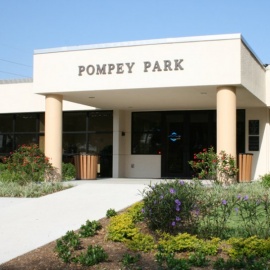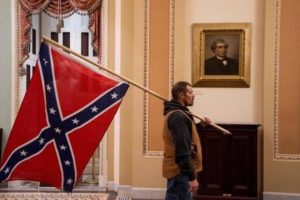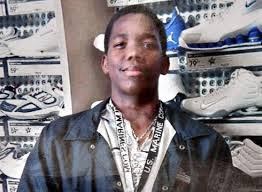
Pompey Park is more than just a name.
Editor’s Note:
I’m posting this blog a few days early because we are off to see Bruce Springsteen & The E Street Band in Orlando and I know I will be too tired to post Monday. Seeing Bruce and the band after 7 long years of waiting is an emotional experience for us “Spring-Nuts” so I’m taking Monday off.
It’s Black History Month and I’m thinking about some of the people who made history right here in Delray Beach.
There are so many local giants, special people who led the way and left a legacy of love and service.
But this year, I’m thinking about one woman in particular: H. Ruth Pompey.
The H was for Hattie.
Mrs. Pompey passed away in 2009.
I miss her.
Mrs. Pompey was married to C. Spencer Pompey, a legendary civil rights leader, coach, and educator.
I’ve been reading Mr. Pompey’s book “Many Rivers to Cross” which his wife published after he passed and maybe that’s why I’ve thinking about Mrs. Pompey.
But there’s another reason she’s on my mind; and while I’m at it I’ve also been thinking about these folks too: Alfred “Zack” Straghn, Elizabeth “Libby” Wesley, Nadine Hart, Loretta and Sam McGhee, Joe and Carolyn Gholston, David and Mary Randolph, Vera Farrington, Lula and Len Butler, Red and Yvonne Odom and Beatrice Tyson.
There are others. So many others. But for now, that list will do.
These were the matriarchs and patriarchs that shaped so many lives in Delray—mine included. We’ve lost many of them, but a few are still around.
We should be grateful for them all.
I’m thinking about them because they possess a common trait: they shared their wisdom with others.
All of them sought out promising up and comers, sat them down, and shared what they had learned. And they were sought out as well. Smart people called them and asked them to share their thoughts, perspectives, and experiences.
It was an informal system and it worked because you learn from your elders and if you’re smart you take what they have learned, and you leverage that knowledge. You stand on the shoulders of those who came before. You reap the harvest from the seeds they struggled to plant and nurture.
That’s how progress happens, you build on the work of past leaders. You don’t rip things down and you don’t incinerate the hard work of others.
People like Mrs. Pompey were stewards. We need stewards because they understand what’s precious and what’s worth preserving.
It’s easy to rip something down.
It’s a lot harder to build something of value.
And sometimes when you erase things they are gone for good. It’s like taking a tree and chopping off its limbs. Often, that tree dies and you’ve lost something majestic forever.
I wonder sometimes whether we understand that cruel rule.
I’ve been reading a lot about Tyre Nichols; trying to make sense of his senseless murder in Memphis. I wanted to know more; to feel more before he is lost forever and replaced by the next headline. And there’s always another headline isn’t there?
I learned that Mr. Nichols was a father, a skateboarder and a photographer who loved capturing sunsets. I have a friend who does the same thing. His name is Kerry and he was once a firefighter in Memphis. Yes, the universe connects us in magical ways.
I’ve also been reading about our Governor and the brouhaha over the AP African American History curriculum. I wonder who he’s consulted, who he’s sat with or if he’s consulted with anyone at all.
And I’ve been seeing the rage on social media that exists in our own community about our community and I’m left to wonder.
What would my friend H. Ruth Pompey say about it all?
Are there people like her still around? Do our leaders seek them out?
I did.
I spoke to many, and they carried me through every crisis, real or imagined in my life. There were many. When you step into the arena, crises come with the territory.
When Mrs. Pompey passed, I got a call from her daughter asking me to eulogize her mother. I had spoken at Mr. Pompey’s funeral in 2001. It was a great honor because he was a great man.
I was touched by the request to pay tribute to Mrs. Pompey.
I recently found the eulogy searching through emails that Mrs. Pompey sent me through the years. I wanted to hear her “voice”, I wanted to connect once more.
She didn’t write me often, she preferred phone calls or visits, but her emails were always full of encouragement and wisdom.
Hope too.
She was full of hope. And she had ambition. Dreams for her community, dreams for the world.
So, I wonder what she would make of “all this” …I don’t have a word for what we are going through. But I hope you know what I mean.
A young man died on the streets of Memphis calling for his mother….
In a few days, some of us will mark the 18th year since our community lost 15-year-old Jerrod Miller. But I suspect that most of us don’t know that name. Or remember what happened right here in our town. Please Google his name because it was an important event in our city.
Many of the people I mentioned earlier got us through that tragedy.
Their wisdom and perspective helped us immeasurably.
They are all part of our history; part of our fabric; part of our town’s DNA.
I fear we are losing that thread.
If you care to read, I’ve shared what I said at my friend’s funeral all those years ago.
She was so special.
We were so blessed.
Remembering Mrs. Pompey…
In the Jewish tradition there is a poem that is often read when a great woman passes.
The hymn is called “A Woman of Valor” and as soon I heard the news about Mrs. Pompey…my thoughts turned to the sentiments expressed in that beautiful 22-line poem, which was the eulogy that Abraham delivered for his wife Sarah.
“A Woman of Valor is worth more than pearls..”
Mrs. Pompey was a woman of valor and her beauty, her elegance, her wisdom, her intelligence, and her love has enriched all of our lives and the community that she called home from the age of 3…her beloved Delray Beach.
Mrs. Pompey’s life was poetry.
Like a poem there was a grace to her that defies my ability to describe…But if you knew her…if you experienced her essence for even a moment..you knew that you were with someone who understood the world…saw its beauty and its pain…and yet radiated hope, love and kindness for all her days.
She had a quality that very people that you meet in this life have…it was a light…
A light that shined so brightly that it not only illuminated her and her family…but also those of us who were blessed to know her….she lit up Delray Beach and this world for 86 years and while we are all saddened by her passing…we are grateful that her light shined for as long as it did on our lives and on our community…we are forever enriched by her presence…the poem that was her life….
I met Mr. and Mrs. Pompey when I was a 22-year-old newspaper reporter…new to Florida…new to my profession…and new to this community.
I sought the Pompey’s out because everyone I spoke with in town said that if I wanted to understand Delray…the history that didn’t necessarily show up in traditional texts…I needed to sit with Mr. and Mrs. Pompey.
And so I did.
We sat in their parlor, where they took time to educate a stranger so that I may do my job better…Mr. and Mrs. Pompey were great teachers and wonderful storytellers and because of the time they spent with me I fell in love with this community…its stories, its promise…its potential and most of all its people.
When I first contemplated public service…I spoke with Mr. and Mrs. Pompey right after I consulted my immediate family. It is fair to say that without their blessing and encouragement I would not have run for office…such was the esteem that I held them in. Their belief in me inspired me…but also instilled in me a huge sense of responsibility.
“If you are going to serve, then make your service matter”…that’s a direct quote from Mrs. Pompey.
“ Don’t waste this opportunity,” she told me with a smile. “The sun rises, the sun sets…don’t hold anything back…make your service and your time on this Earth count.”
I wrote those words down in my reporter’s notebook and carried it with me in my heart and my mind through seven years of trials and tribulations in public office.
I loved Mrs. Pompey and I know she loved me…because she told me so. During some of my darkest moments…the kind of times when you question whether you have the fortitude to go on, I’d sneak over to her house across the street from the park named for her dear husband and she never failed to set me straight. Never…
I later learned she performed the same miracles for many others over decades and decades of life and service to others…she made each of us lucky enough to be exposed to her wisdom…..her poetry…feel like we were the most special people in the world. We were certainly the most fortunate…
I am a lucky man…because I have had 7 such special forces in my life…Mr. and Mrs. Pompey… Ms. Elizabeth Wesley…my grandfather, my mother, father and my wife…Three of those people are not kin, in the traditional sense anyway….but it didn’t matter …they made me feel like family.
Mrs. Pompey called me cousin Jeff…we were blood she joked…because several years ago I was privileged to donate blood after one of Mrs. Pompey’s surgeries.
“It’s official,” she said “We’re cousins.” And truth to be told… I did feel closer to her.
My wife reminded me this week of one of her favorite sayings…death does not end a relationship…the love goes on…and that is so true. And to the Pompey family…and all of us gathered here…we will continue to have a relationship with Mrs. Pompey because her lifeforce, her wisdom, the lessons she taught all of us will endure forever.
Mrs. Pompey…like her husband… was a visionary. She believed in education. She believed in G-D…she believed in community, service, sisterhood, and the potential of this city to be a beacon for the rest of America…and because she believed …we did too.
She worried about today’s young people…and we talked about the young men and women she saw outside her window…she took pride in those who sought knowledge and opportunity.
And she worried…really worried– about those left behind to wander the streets.
We spoke through the years about Delray’s history, and she told me of her husband’s many crusades…always playing down her role in his remarkable life. But we knew better…There were times—and I experienced a few of them…when she held this community together.
Mr. Pompey…he loved her so…they crossed many rivers together and showed us all a better future….
When Mr. Pompey passed in 2001, the light in Mrs. Pompey’s eyes dimmed…of course she had enough to light up a football field…but you could see she was not quite the same…Still… she persevered… it was tough though.
She missed the love of her life, every moment of her life.
Together they crossed so many rivers….integrating the beach right here in Delray…fighting for equal pay for African American teachers…ensuring that black children received the same number of days of instruction as their white neighbors and so much more…she never felt her work was done…my friends…that’s how the great ones think…as much as they achieve…as many accomplishments as they rack up…they see how much work there is left to do…they see the possibilities where others see limitations…they see more rivers to cross, which was the name of Mr. Pompey’s book.
And I wonder…as we lay Mrs. Pompey to rest alongside the love of her life…I wonder where we find people to take up the mission she so gladly and so gracefully took on.
She not only lived a good life, but a grand life. She did big things…she was a long-term thinker…she stood for causes larger than herself. There was no agenda…other than making her piece of the world better for others.
My hope is that the life she has led…this great woman of valor….is an inspiration for all of us to rise above our own problems and endeavor to make this world, this community a better place…find a river to cross…the rivers are there… all around us…
I’ll conclude with a funny anecdote…I hope it brings a smile to your face on this sad day…
Near the end of Mr. Pompey’s incredible life…we decided to hire a sculptor to capture the image of this great man in Bronze…sadly shortly after his sitting for the sculpture, Mr. Pompey passed away. But the project continued and the sculptor…inspired by Pompey’s legacy…finished her masterpiece…
The finished product was larger than life. Literally.
It also didn’t look anything like Mr. Pompey…in fact…truth be told…when we showed it to people, they thought it looked like Zack Straghn….
But the artist insisted she captured Mr. Pompey’s spirit, and so we showed the sculpture to Hattie Ruth…now we all know how polite and genteel she was. Her greatest delight was showing her friends pictures of her sororities debutantes…taking great pride in their appearance and their manners…
True to form….she looked at the sculpture and not having the best poker face…it was clear that she thought it looked like Mr. Straghn too…but she didn’t want to hurt the artist’s feelings so she said she could…well…live with it.
So, the artist left and a day or so passed…a few of us called just to make sure that she was OK with this sculpture…we reminded her that this piece was going to be in City Hall in her hometown forever…and that as much as we loved Mr. Straghn…and you certainly deserve your very own sculpture sir…maybe we ought try again.
And so, we did. And the artist…our dear friend George Gadson, got it right. But Mrs. Pompey made sure we didn’t hurt the original artist. That was Mrs. Pompey always concerned about others.
Today that sculpture greets all those who come to the heart of power and citizen led government in Delray Beach…it is my wish that we add to that collection and find a way to honor Mrs. Pompey so that generations of people who visit, live, work and study in Delray shall know the impact of this great woman and this great family.
Their memory should be a daily and living reminder of sacrifice…service over self…civility….and equal opportunity for all.
She once gazed out her window and worried about the youth of this community…we can cross that river in her honor and do our best as a village to heal those whose lack of direction in life troubled her so.
Mrs. Pompey loved poetry— her favorite poet was Paul L. Dunbar. I read his works this week as I mourned the loss of my friend…my family member by blood….and I drew comfort from the words of this African American poet who died at 33 in 1905….
This is a poem called “The Farmhouse by the River”…When I read this, I want you to picture that small ranch house overlooking Pompey Park….
“I know a little country place where still my heart does linger,
And over its fields is every grace lined out by memory’s finger.
Back from the lane where poplars grew and aspens quake and quiver,
There stands all bath’d in summer’s glow a farm house by the river.
Its eaves are touched with golden light so sweetly, softly shining,
And morning glories full and bright about the doors are twining.
And there endowed with every grace That nature’s hand could give her, there lived the angel of the place in the farm house by the river.”
Mrs. Pompey crossed many rivers …she was the angel of a place call Delray…and she will live in our hearts forever….





